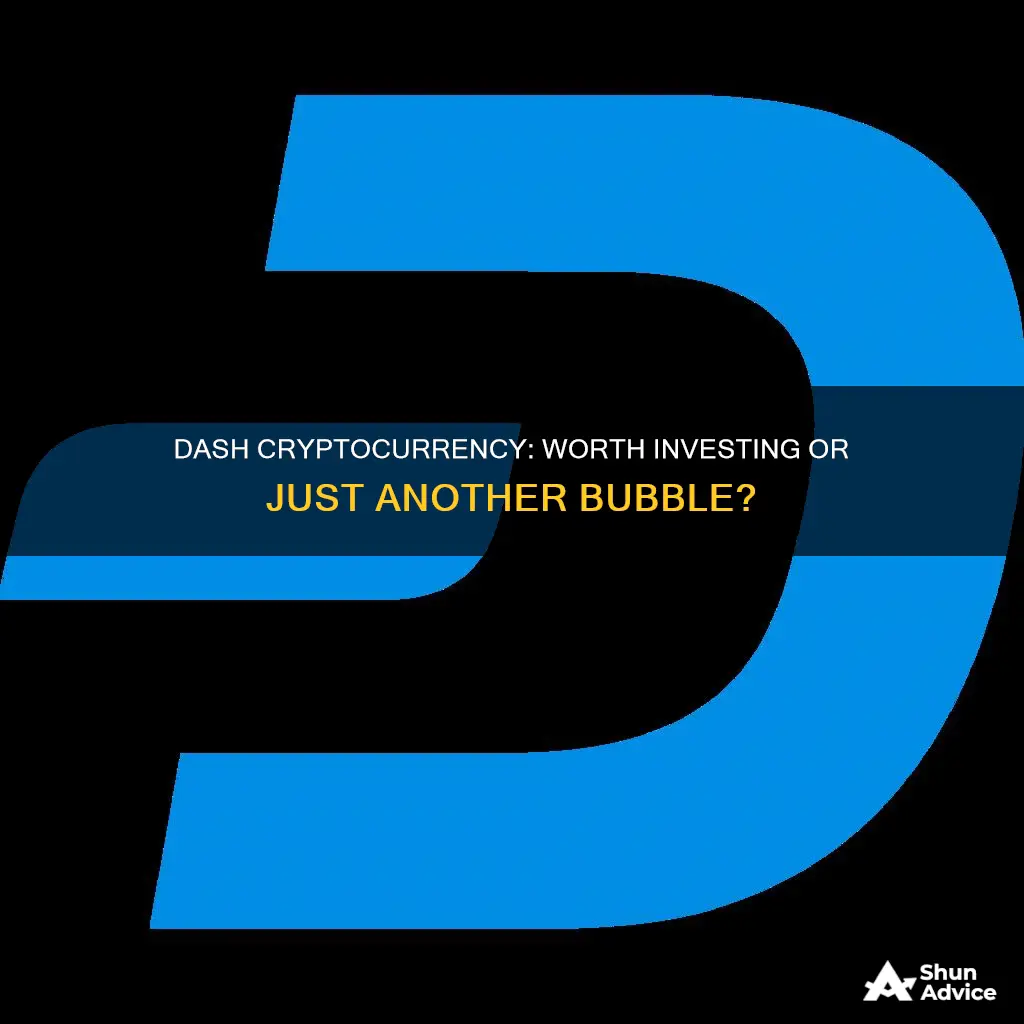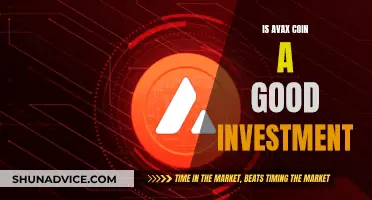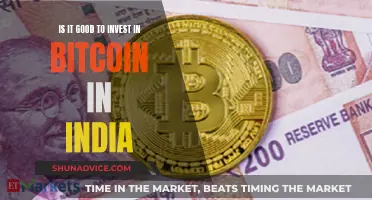
Dash (DASH) is a digital currency that aims to provide fast, cheap, and private payments anywhere in the world. It was launched in 2014 as Xcoin, later rebranding to Darkcoin, and finally Dash, which stands for digital cash. Dash is based on Bitcoin but uses a two-tier network structure for improved efficiency. The first tier is a proof-of-work system, while the second tier consists of masternodes that power several of Dash's features, including fast transaction times and enhanced privacy.
Dash has seen strong growth and has been integrated as a payment option on millions of online retail outlets. It is also used as a transactional currency in South America, particularly Venezuela. However, it has faced regulatory scrutiny due to its privacy-enhancing features and has been delisted from some exchanges.
Dash's price has been volatile, and it is currently trading below its all-time high. However, some experts believe it could be a good investment, with the potential for significant returns.
What You'll Learn

What is Dash?
Dash, derived from "digital cash", is an open-source blockchain and cryptocurrency that was launched in January 2014 as a fork of Litecoin. It was originally called XCoin, and later rebranded to Darkcoin before becoming Dash in March 2015.
Dash was founded by software developers Evan Duffield and Kyle Hagan. Duffield, who had experience in finance and public relations, conceived Dash in 2012 with the intention of adding more anonymity to Bitcoin—hence the original name Darkcoin.
Dash is a decentralised autonomous organisation (DAO) run by a subset of its users. It is designed to be a fast, cheap, global payments network with a swift governance structure. It offers a two-tier network with incentivised nodes, including "masternodes", and decentralised project governance. It also offers InstantSend for instantly settled payments, ChainLocks for instant blockchain immutability, and PrivateSend for optional transaction privacy.
Dash is marketed to both individual users and institutions, including merchants, financial services, traders, and those who need to send international remittances. Its governance system, or treasury, distributes 10% of the block rewards for the development of the project in a competitive and decentralised way. This has allowed the creation of many funded organisations, including Dash Core Group.
Dash uses a proof-of-work mining algorithm, with a hash function called "X11", which uses a sequence of 11 hashing algorithms. It is designed to enable cheap instant transactions and has a unique proof-of-service consensus algorithm that rates masternodes based on their history of providing good services to the network.
Dash Coin Investment Guide for Indians
You may want to see also

How does Dash work?
Dash is an open-source cryptocurrency, designed as a fork of the Bitcoin protocol. It was launched in January 2014 as "Xcoin" by Evan Duffield, and was positioned as a privacy-centric alternative to Bitcoin.
Dash stores all transactions made by users on a public ledger, allowing the network to verify that users have sufficient funds in their wallets to make transactions. It runs a two-tier network where miners and masternodes work in tandem, making it quicker to process transactions than Bitcoin.
Masternodes are a subset of users who perform critical functions on the Dash network. They are responsible for private transactions (PrivateSend), instant transactions (InstantSend), and the governance and treasury system. To become a masternode, a user must make a deposit of a minimum of 1000 DASH. Masternodes are incentivised by receiving 45% of the total reward received from mining a DASH coin.
Dash also offers a service called PrivateSend, which adds privacy to transactions. This service allows users to mix their tokens for additional privacy, making it difficult to trace transactions and user identities.
Dash has gained popularity due to its improved privacy and higher transaction speeds compared to Bitcoin. It has positioned itself as a payment method, aiming to become a medium for daily transactions. It is accepted by over 159,000 merchants globally and is listed on 265 exchanges.
Morris Coin: A Guide to Investing in the Crypto
You may want to see also

How does Dash compare to Bitcoin?
Dash and Bitcoin are both digital assets that use decentralised blockchain technology to enable fast, secure transactions without the need for third-party intermediaries like banks. However, there are several key differences between the two cryptocurrencies.
One of the main differences is that Dash was designed to offer cheaper and faster transactions, enhanced privacy measures, and a more democratic governing system. Dash transactions are typically lower in cost than Bitcoin transactions, especially during periods of high demand, which can cause costly network fees for BTC users. Additionally, Dash features InstantSend technology, providing almost instantaneous transaction confirmations, while Bitcoin transactions can be lengthy and laborious.
Another distinction lies in their privacy features. Dash provides PrivateSend, allowing customers to mix their transactions with other users' to enhance anonymity. In contrast, Bitcoin's transparency through its public ledger makes it easier to trace transactions.
Dash also has a unique governance structure, allowing its community to vote on significant proposals and decisions, ensuring a decentralised network with transparent decision-making. On the other hand, Bitcoin's control lies mainly with its codebase developers.
In terms of mining algorithms, Dash uses the X11 algorithm, a modification of the proof-of-stake (PoS) algorithm, while Bitcoin uses the proof-of-work (PoW) algorithm. The X11 algorithm employs 11 different hashing functions and can be used in conjunction with CoinJoin, a technique that mixes transactions to enhance privacy.
Dash's two-tier network structure includes a proof-of-work system for mining and a second tier of "masternodes" that facilitate InstantSend and CoinJoin features. Masternodes are users who own at least 1,000 Dash and are responsible for approving transactions and providing services like payment and privacy to the Dash network. This structure simplifies transaction verification and validation, addressing Bitcoin's scalability challenges.
While Bitcoin has a larger market capitalization and user base, Dash offers advantages in transaction speed, cost, privacy, and governance. However, it has faced scrutiny due to its privacy features, and its long-term investment potential is uncertain.
The Right Time to Invest in Bitcoin?
You may want to see also

Is Dash a good investment?
Dash (DASH) is a digital currency that offers fast, cheap payments anywhere in the world. It was launched in 2014 as Xcoin, later rebranded to Darkcoin, and finally to Dash in 2015, which stands for "digital cash". Dash is based on Bitcoin but uses a two-tier network structure for improved efficiency. The first tier is a proof-of-work system, and the second tier consists of "masternodes", which are special servers with a full copy of the Dash blockchain.
Dash has been described as a good investment by some experts, who point to its strong team, partnerships, and potential for growth. It is currently accepted at over 155,000 merchants worldwide and has a market cap of $341 million as of May 2024. Its 24-hour trading volume was $32.7 million on the same date.
However, there are also risks to investing in Dash. It is extremely volatile, and its price can change by 10% or more in a single day. Additionally, Dash has been controversial due to issues when it launched, including the difficulty of mining, which led to nearly 2 million DASH being issued in the first 24 hours. This has led some in the crypto community to claim that Dash is a scam.
In conclusion, whether Dash is a good investment depends on your risk tolerance and investment goals. It has the potential for high returns but also comes with significant risks. It is important to do your own research and only invest what you can afford to lose.
Coinbase IPO: How to Invest and Make Profits
You may want to see also

What is the future of Dash?
Dash is a cryptocurrency that was launched in 2014 as a payment method with a privacy focus, intending to provide more anonymity than Bitcoin. It is a fork of the Bitcoin blockchain, designed to have a swift governance structure and enable cheap instant transactions.
Dash has had a controversial history, with critics calling it a scam due to issues when it was launched. However, it has maintained a decent market value since 2019 and had a 24-hour trading volume of $32.7 million on May 5, 2024.
The future of Dash is difficult to predict, as with any cryptocurrency, due to its volatile nature. However, there are several factors that could influence its success.
One of the biggest reasons to invest in Dash is its integration as a payment option on millions of online retail outlets. Dash has also seen success in South America, particularly Venezuela, where it has been used as a transactional currency. If this trend continues and more partnerships are forged, it could drive up the value of Dash.
Additionally, Dash has a strong team behind it, with four groups working to improve the network and increase its adoption. The Dash Core Group, for example, employs a modified version of Proof of Stake called X11, which helps Dash scale faster and process more transactions at a lower cost.
Dash has also been predicted to be a good long-term investment by some experts, with potential price increases in the coming years. For example, analysts at Digital Coin Price predict a price of $116 by the end of 2023, while Wallet Investor estimates a maximum price of $250 by the end of the same year.
However, there are also potential drawbacks to investing in Dash. It has been the subject of regulatory scrutiny due to its privacy-enhancing features, and it faces strong competition from other cryptocurrencies with similar aims as transactional currencies.
Overall, the future of Dash is uncertain, but it has the potential to be a successful long-term investment if it can continue to forge partnerships, increase its adoption, and stay compliant with regulations.
Microstrategy's Big Bitcoin Bet: Millions Invested
You may want to see also
Frequently asked questions
Dash (DASH) is a digital currency that offers fast, cheap payments anywhere in the world. It was launched in 2014 as XCoin, later rebranded to Darkcoin, and finally changed to Dash, which stands for "digital cash".
Dash has a two-tier network structure, with miners and masternodes running in tandem, making it quicker to process transactions. Masternodes are special servers with a full copy of the Dash blockchain, and users who have at least 1,000 Dash can operate them.
Like any cryptocurrency investment, Dash is high risk and high reward. It is extremely volatile, with its price fluctuating by 10% or more in a single day. Additionally, there have been controversies surrounding the launch of Dash, including issues with mining difficulty, which led to accusations of it being a scam.
As of September 2024, the price of Dash is around $23.53 USD. It has seen strong growth but is subject to the same ups and downs as other cryptocurrencies.
Dash has the potential to be a good investment, with its integrations as a payment option on millions of online retail outlets and its usage as a transactional currency in South America, particularly Venezuela. However, investing in Dash comes with risks due to the unpredictable nature of the cryptocurrency market. It is important to do your own research and only invest what you can afford to lose.







